
Peasantry and Land Settlement
In Africa, despite increasing urbanization a majority of the population can still be classified as peasants. Peasants are people such as farmers and livestock herders who make their living off the land, generally using only manual labor and nonmechanized technology. Africa's climate and the poor quality of much of its soil have long presented challenges to peasants. These factors have […]
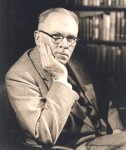
Paton, Alan
1903–1988 South African writer Alan Paton was a white South African novelist and a dedicated political activist. Through his writing and his political efforts, he protested against racial injustice and apartheid. Born and educated in Pietermaritzburg in the Natal province of South Africa, Paton worked as a schoolteacher. Then he served as the head of a reform school for […]
Osei Tutu
ca. 1636–1717 Asante king Osei Tutu, the first king of the ASANTE people of western Africa, united the people in campaigns of military conquest and expansion. In about 1685 Osei Tutu succeeded his uncle as ruler of Kumasi, one of many Asante states. He continued the wars of expansion that his uncle had begun and brought the various Asante […]
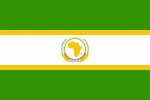
Organization of African Unity
The Organization of African Unity (OAU) is an organization founded to promote harmony between African governments. It seeks to coordinate and increase cooperation among African nations, to defend their independence, and to eliminate all forms of colonialism from Africa. The OAU also promotes international cooperation in keeping with the charter of the UNITED NATIONS and the Universal Declaration of Human Rights. […]

Oral Tradition
Every society passes information about its history, myths, and customs along to new generations. In many African societies such material has been transmitted orally, through the spoken word. This method of passing along literature and history is oral tradition. African oral tradition involves both the material that is spoken—the oral art—and the setting in which it is spoken. Although very […]

Olympio, Sylvanus Epiphanio
1902–1963 President of Togo The first president of TOGO, Sylvanus Olympio was also the first leader of an independent African country to be overthrown by a military coup. Olympio was born into a wealthy family and studied in Europe before embarking on a career with a multinational company operating in Togo. He rose high in the company but was […]
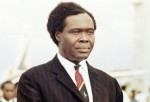
Obote, Milton
1924–2005 President of Uganda Milton Obote sought to end British colonial rule in East Africa and twice served as president of UGANDA. Expelled from Makerere University in Uganda for political activity, he moved to KENYA where he joined a number of African political groups. When he returned to Uganda several years later, he was elected to the newly formed Legislative […]

Nyerere, Julius Kambarage
1922–1999 President of Tanzania Julius Nyerere led the fight to end British rule in Tanganyika (now TANZANIA) and served as the country's president from 1962 to 1979. He also played a key role in Africa's struggle for freedom and social justice, and African independence movements found refuge in his country. The son of a chief, Nyerere was educated in […]

Nwapa, Flora
1931–1993 Nigerian writer One of Africa's leading female authors, Flora Nwapa used her work to promote the role of women in society. She was the first black African woman to have a novel published, and she founded Tana Press in 1977 to bring the works of African women to the public. Born at Oguta in eastern Nigeria, Nwapa […]
Number Systems
The peoples of Africa employ a wide variety of systems for counting objects or representing numbers. Many of these are verbal systems, others involve gestures, and some use pictures or other counting devices. Verbal number systems use words to express quantities. Most are founded on the numerical bases of 5, 10, and 20. For example, the Makhwa of MOZAMBIQUE use […]
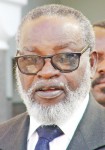
Nujoma, Samuel Shafiishuna
1929– President of Namibia Sam Nujoma was a political organizer in colonial NAMIBIA (then known as South West Africa), who became the country's first president. As a young man, Nujoma worked for the railway but was fired from his job for attempting to organize a union. In 1958 he founded and became president of the Ovamboland People's Organization. His […]

Nubia
Nubia, a region along the NILE RIVER, is now divided between southern EGYPT and northern SUDAN. The region takes its name from the Nubians, a distinctive ethnic group who speak languages of the Nubian family. Although there has never been a nation called Nubia, the region has been home to a number of empires and states. Around 2,000 years […]
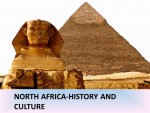
North Africa: History and Cultures
Separated from the rest of Africa by the SAHARA DESERT, the peoples of North Africa share a language and many cultural, political, and economic traditions. The term North Africa refers to the modern states of EGYPT, LIBYA, TUNISIA, ALGERIA, and MOROCCO, as well as the territory of WESTERN SAHARA. In ancient times the lands north of the Sahara and […]

North Africa: Geography and Population
North Africa consists of five countries that border the Mediterranean Sea—EGYPT, LIBYA, TUNISIA, ALGERIA, and MOROCCO. The SAHARA DESERT, the dominant feature of the North African landscape, sweeps across the southern part of the region. The Sahara serves as a geographical boundary between North Africa and sub-Saharan Africa, except in Egypt. It also marks a transition zone from the largely […]

Nongqawuse
ca. 1840–ca. 1900 Xhosa prophet Nongqawuse was a young woman whom the XHOSA people of SOUTH AFRICA regarded as a prophet who communicated with the spirit world. She urged them to kill their cattle—advice that proved tragic for her people and their kingdom. An orphan, Nongqawuse was raised by her uncle, a Christian convert, in South Africa's Transkei region. […]

Nkrumah, Kwame
1909–1972 President of Ghana Francis Nwia Kofi Nkrumah, known as Kwame Nkrumah, was the prime minister and first president of GHANA. Born in the Gold Coast (present-day Ghana), Nkrumah attended Achimota College in the colony. He continued his studies in the United States, where he served as president of the African Students Association, and in England. In London he wrote […]
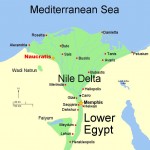
Nile River and Delta
The Nile, the world's longest river, begins in the heart of Africa and empties into the Mediterranean Sea. Snaking north through eastern Africa for more than 4,000 miles, the river passes through nine countries on its way to the sea. The Nile basin, the area drained by the river's tributaries, covers 1.2 million square miles. For thousands of years, […]
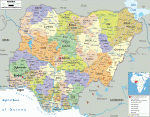
Nigeria
POPULATION: 177.5 million (2014) AREA: 356,669 sq. mi. (923,774 sq. km) LANGUAGES: English (official); Hausa, Yoruba, Igbo NATIONAL CURRENCY: Naira PRINCIPAL RELIGIONS: Muslim 50%, Christian 40%, traditional 10% CITIES: Abuja (Federal Capital Territory), 378,700 (1991 est.); Lagos, Ibadan, Ogbomosho, Kano, Ilorin, Oshogbo ANNUAL RAINFALL: Highly variable, 70–170 in. (1,700–4,310 mm) from west to east along the coast; 20 in. (500 mm) in the […]

Niger River and Delta
The Niger River flows in a great arc through West Africa. The continent's third longest river, after the NILE RIVER and CONGO RIVER, it has carried travelers, traders, and explorers for hundreds of years. The Niger still serves as a highway for people and goods, but it also supplies water for agriculture and hydroelectric power. The delta at the […]
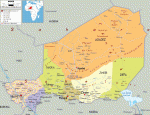
Republic of Niger
POPULATION: 19.11 million (2014) AREA: 489,189 sq. mi. (1,267,000 sq. km) LANGUAGES: French (official); Hausa, Dejerma, others NATIONAL CURRENCY: CFA franc PRINCIPAL RELIGIONS: Muslim 80%, Christian 10%, Traditional 10% CITIES: Niamey (capital), 420,000 (1994 est.); Zinder, Maradi, Tahoua, Dosso, Agadez, Arlit ANNUAL RAINFALL: Varies from 20 in. (500 mm) in the south, to 4 in. (100 mm) at Agadez, to almost 0 in. […]

Ngugi wa Thiong’o
1938– Kenyan author Writer Ngugi wa Thiong'o is known not only for his literary work but also for his political protests and his commitment to writing in African rather than European languages. Born into a peasant family of the GIKUYU people near NAIROBI, KENYA, Ngugi received an education at a colonial high school. He began to write while attending […]

Neto, Augustinho
1922–1979 President of Angola Augustinho Neto was a leader in the fight against colonial rule in ANGOLA and the country's first president after independence. The son of a pastor, Neto went to Portugal to study medicine in 1947 but soon became involved in the Angolan independence movement and was also involved in communist activities. After returning to Angola in 1958, […]
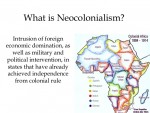
Neocolonialism
After independence, some African nations declared their political allegiance to their former European rulers—such as Britain, France, and Belgium—and continued to rely on them for economic assistance. This policy became known in the 1960s as neocolonialism. Not all African nations chose to pursue neocolonial relationships. Those that had gained independence after violent struggles against European powers, such as ALGERIA, usually chose […]
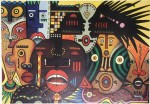
Negritude
Negritude was a black literary and cultural movement that spanned the 1930s to 1950s. The movement first took shape among French-speaking writers in Africa and the Caribbean. The leading figure in the Negritude movement was Leopold Sedar SENGHOR, a poet and philosopher who became the first president of SENEGAL when it won independence from France in 1960. The origins of […]
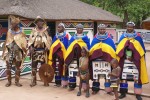
Ndebele
The Ndebele are an offshoot of a group of BANTU-speaking peoples of southern Africa known as the Nguni. The branch of the Ndebele that is centered in ZIMBABWE traces its roots to MZILIKAZI, a former lieutenant under SHAKA ZULU. The other branch, founded by the leader Musi, is located in SOUTH AFRICA. Both branches of the Ndebele at one […]
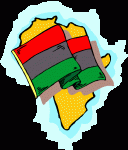
Nationalism
Nationalism is the belief that a group of people have the right to live in and govern their own nation-state. European powers had gained control over most of Africa in the late 1800s and established colonies. In the 1900s, African nationalist movements emerged in many parts of the continent that sought to end colonial rule and European economic power. Eventually, […]
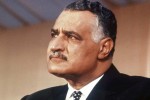
Nasser, Gamal Abdel
1918–1970 President of Egypt President of EGYPT from 1956 to 1970, Gamal Abdel Nasser was a leading figure in the Arab world. The son of a postal clerk, Nasser attended primary school in a small village in the Nile Delta. He moved to his uncle's home in Cairo, where he received his secondary education and then attended law school […]
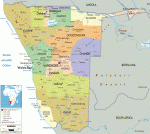
The Republic of Namibia
POPULATION: 2.403 million (2014) AREA: 317,260 sq. mi. (824,295 sq. km) LANGUAGES: English (official); Afrikaans, German, Damara, Herero, Kavango, Ovambo, Nama NATIONAL CURRENCY: Namibian dollar PRINCIPAL RELIGIONS: Christian 80–90%, Traditional 10–20% CITIES: Windhoek (capital), 190,000 (1995 est.); Walvis Bay, Swakopmund, Keetmanshoop, Rehoboth ANNUAL RAINFALL: Varies from less than 2 in. (51 mm) in western Namib and lower Orange River valley to more than 19.8 […]
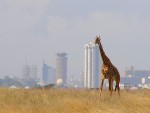
Nairobi
Nairobi, the capital of KENYA, is the largest city in eastern Africa south of CAIRO, Egypt. British colonists founded Nairobi in 1899 as a camp for laborers who were building the railroad from the coastal city of Mombasa to Lake Victoria. A railway yard and depot were established, and the camp grew rapidly into a town. In 1905 the […]
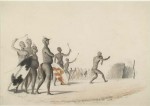
Mzilikazi
ca. 1790–1868 Founder of Ndebele kingdom For a short time in the early 1800s, Mzilikazi served as a lieutenant in the army of the Zulu ruler SHAKA ZULU. After one battle, Mzilikazi kept the cattle he captured instead of sending them to Shaka. When the chief sent men to investigate, Mzilikazi insulted Shaka by cutting the feathers off their […]
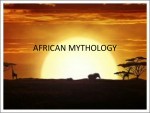
Mythology
Myths are the stories that define a culture. They tell of the creation or beginning of the world; of deities and their relations with humans; and of the values, heroes, and histories of a group or society. Cosmological myths—those about the origin, structure, or purpose of the universe—reveal a culture's ideas about the universe. With the passage of time, myths […]

Mvemba Nzinga
ca. 1465–1543 Ruler of kingdom of Kongo Mvemba Nzinga, son of the ruler of the kingdom of Kongo, was baptized as a Christian in 1491 and took the name Afonso I. When his father died in 1506, Mvemba Nzinga became king, claiming that he had divine help in gaining the throne. He increased his power by selling ivory, copper, […]
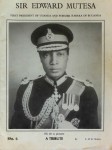
Mutesa II, Frederick
1924–1969 Ruler of Buganda Frederick Mutesa II, known as “King Freddie” by Westerners, was ruler of the East African state of Buganda from 1939 to 1953. Buganda enjoyed special treatment within the British colony of UGANDA until 1953. When the British decided to end Buganda's special status, Mutesa demanded independence for his kingdom. When he also refused to pass along […]
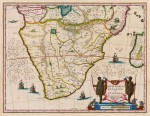
Mutapa
Mutapa, or Mwene Mutapa (meaning “Ravager of the Lands”), is the title held by a dynasty of kings that ruled the area that is now ZIMBABWE and MOZAMBIQUE from the 1400s to the 1880s. Historians also use the term to refer to the state led by these kings. The Mutapa state probably arose from branches of the nearby culture […]
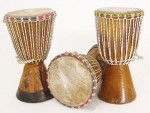
Musical Instruments
Wall paintings in ancient Egyptian tombs show that the people of Africa have made and played musical instruments for thousands of years. Over the centuries, the many invaders of Africa introduced new instruments. Arabs brought musical instruments and styles that became part of the culture of North Africa, the western savanna, and the eastern coast. European colonial armies and missionaries […]
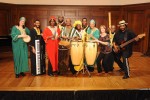
Music and Song
From the rural farmlands of MOZAMBIQUE to the booming dance halls of NIGERIA, music plays an essential role in the lives of Africans. Many regions have rich, deeply rooted traditions of music and song. But Africans have also incorporated in their music various outside influences—of the Arabs who arrived on the continent long ago, of the Europeans who ruled until […]

Museveni, Yoeri
1944– President of Uganda Yoweri Museveni, a former political activist, became president of UGANDA in 1986. Under his leadership, Uganda has achieved considerable political stability and economic growth. As a youth Museveni organized a movement to prevent pastoralists from being forced off their lands. He attended the University of Dar es Salaam in TANZANIA, where he led a student group […]
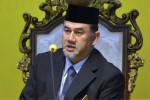
Muhammad V
1909–1961 King of Morocco King Muhammad V was the first ruler of MOROCCO after the country gained its independence from France in 1956. Born Sidi Muhammad, the future king was the son of Sultan Moulay Yusuf. When Yusuf died in 1927, the French colonial authorities named the 18-yearold Muhammad as the new sultan. The French hoped to control the young […]

Mugabe, Robert
1924– President of Zimbabwe Robert Mugabe has been the leader of ZIMBABWE since the country achieved independence in 1980. Born and educated in a Catholic mission in the British colony of Southern Rhodesia, Mugabe became a teacher. In 1956 he moved to the newly independent nation of GHANA. Several years later, he returned to his home country and entered […]
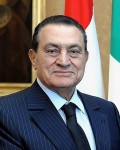
Mubarak, Hosni
1928–2011 President of Egypt Hosni Mubarak became president of EGYPT in 1981 after the assassination of Anwar SADAT. Reelected several times, Mubarak has steered Egypt through a difficult period marked by growing unrest, guerrilla violence, and threats from Islamic political groups. Born in the Nile River delta to a peasant family, Mubarak graduated from the Cairo Military Academy […]
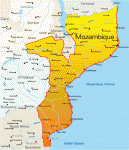
Republic of Mozambique
POPULATION: 27.22 million (2014) AREA: 308,642 sq. mi. (799,384 sq. km) LANGUAGES: Portuguese (official); Sena, Shona, Makua, Swahili, and others NATIONAL CURRENCY: Metical PRINCIPAL RELIGIONS: Traditional 50%, Christian 30%, Muslim 20% CITIES: Maputo (capital), 3,025,000 (2000 est.); Tete, Beira, Quelimane, Sofala ANNUAL RAINFALL: 55 in. (1,420 mm) in center, less in the north and south ECONOMY: GDP $16.39 billion (2014) PRINCIPAL PRODUCTS […]
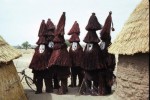
Mossi
The Mossi are the largest ethnic group in BURKINA FASO, making up almost half of the population. They speak Moore, which is used as a common language throughout the country. The Mossi arose from the merging of many different ethnic groups and formed several competing empires. Soldiers known as Mossi conquered the city of TIMBUKTU during the reign of Emperor […]
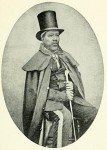
Moshoeshoe I
1786–1870 Founder and king of Basutoland Founder and king of the Basotho nation (present-day LESOTHO), Moshoeshoe I was noted for his military skill and diplomatic abilities. He played a major role in protecting Lesotho from conquest by European settlers, and he helped the country achieve independence. Originally named Lepoqo, Moshoeshoe was the son of a Koena chief. While a young […]
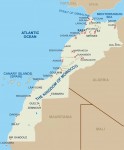
Kingdom of Morocco
POPULATION: 33.92 million (2014) AREA: 178,620 sq. mi. (446,550 sq. km) LANGUAGES: Arabic (official); French, Berber dialects NATIONAL CURRENCY: Dirham PRINCIPAL RELIGIONS: Muslim 98.7%, Christian 1.1%, Jewish 0.2% CITIES: Rabat (capital), 1,496,000 (2000 est.); Casablanca, Marrakech, Fez, Oujda ANNUAL RAINFALL: Varies from about 32 in. (800 mm) to less than 8 in. (200 mm) in the northern coastal lowlands, and 30–80 in. (760–2,030 mm) […]

Money and Banking
African societies had many types of money in the precolonial period, but no banking systems. As Europeans established colonies in Africa in the late 1800s and early 1900s, they introduced uniform systems of money and established banks to handle the exchange of money and other financial transactions. MONEY Money has three distinct functions. It can serve as a medium […]
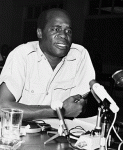
Mondlane, Eduardo Chivambo
1920–1969 Mozambican anticolonial leader Eduardo Mondlane established the freedom movement known as FRELIMO that eventually won MOZAMBIQUE's independence from Portugal. Educated in South Africa, Portugal, and the United States, Mondlane became heavily involved with the movement for Mozambican independence. He concluded that Portugal's inflexible attitude probably meant that war was inevitable for Mozambique. However, he was determined to avoid devastating the country […]

Moi, Daniel arap
1924– President of Kenya In 1978 Daniel Toroitich arap Moi succeeded Jomo KENYATTA as president of KENYA. Moi has managed to remain in power since then, despite a growing opposition and accusations of corruption. A member of the Kalenjin people, an ethnic minority in Kenya, Moi worked as a teacher as a young man. In 1955 he was one […]
Mogadishu
Mogadishu, the capital of SOMALIA, is the nation's largest city and major seaport. During the long civil war that ravaged Somalia in the 1980s and 1990s, large parts of the city were destroyed, and hundreds of thousands of its inhabitants fled to other towns and to the countryside. Mogadishu was founded in the A.D. 900s as a Swahili and […]
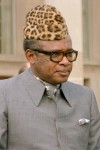
Mobutu Sese Seko
1930–1997 President of Zaire President of Zaire—now known as CONGO (KINSHASA)—from 1965 to 1997, Mobutu Sese Seko ruled as a dictator. His regime gained a reputation for corruption and mismanagement. Despite Zaire's rich natural resources, the nation suffered a serious economic decline under Mobutu's rule. Born Joseph Desire Mobutu in the Belgian colony of Congo, Mobutu was educated in missionary […]

Missions and Missionaries
Christian missionaries have played an important, yet inconsistent, role in African history. While the goal of missions has remained the same—to convert indigenous peoples to CHRISTIANITY, methods and attitudes have changed dramatically over time. During the last 1,500 years, the focus of missionary activity in Africa has shifted from the people in power to the average African. As a result, […]
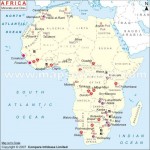
Minerals and Mining
Deep in the ground of the African continent lies a wealth of minerals, metals, and gems. But few African countries—and few Africans—receive the benefits of these resources. The lack of technology and investment money have limited mining operations, and not all countries have significant resources. However, even countries with major deposits have seen most of the profits go to foreign […]
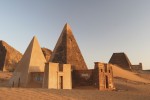
Meroe
Located on the Nile River about 120 miles north of present-day KHARTOUM, the royal city of Meroe was the capital of the ancient kingdom of Kush. The kingdom arose in the region known as NUBIA (in what is now southern Egypt and northern Sudan) about 750 B.C. and flourished until the A.D. 300s. Although strongly influenced by Egypt, the Kushites […]
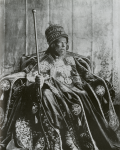
Menilek II
1844–1913 Emperor of Ethiopia Menilek II was the son of the heir to the kingdom of Shewa in what is now central ETHIOPIA. In 1856 TEWODROS II used modern weapons to conquer Shewa and many other parts of Ethiopia. Menilek was captured and taken to Tewodros's court, where he was raised and educated. Nine years later, he escaped and […]
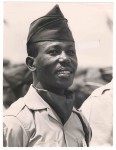
Mengistu Haile Mariam
ca. 1942– President of Ethiopia Mengistu Haile Mariam led a military coup that removed Ethiopia's emperor HAILE SELASSIE I from power in 1974. As head of state, Mengistu hoped to modernize Ethiopian society and unify the country by lessening ethnic rivalries. Mengistu's military career began when he joined the Ethiopian army at the age of 14. After attending officer […]
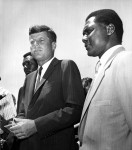
Mboya, Tom
1930–1969 Kenyan labor and political leader Tom Mboya was a labor leader who played a key role in the early government of KENYA after independence. At age 22 he founded a government workers' union and later became general secretary of the Kenya Federation of Labor. At the time, labor organizations had considerable power in Kenya (then a British colony) because […]

Mauritius
The small island nation of Mauritius lies about 500 miles east of MADAGASCAR in the Indian Ocean. It consists of Mauritius and several small islands off to the north and east. Once heavily dependent on the production of sugar, Mauritius has developed a strong economy that includes a variety of manufacturing industries. Of volcanic origin, the island of Mauritius […]
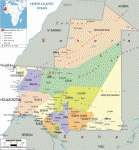
The Islamic Republic of Mauritania
POPULATION: 3.970 million (2014) AREA: 397,953 sq. mi. (1,030,700 sq. km) LANGUAGES: Hasaniya Arabic, French (both official); Wolof, Pular, Soninke NATIONAL CURRENCY: Ouguiya PRINCIPAL RELIGIONS: Muslim, nearly 100% CITIES: Nouakchott (capital), 735,000 (1995 est.); Atar, Zouerate, Kaedi, Nouadhibou ANNUAL RAINFALL: Varies from less than 20 in. (500 mm) in the south to less than 4 in. (100 mm) in the northern desert region […]
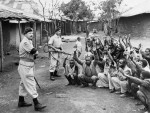
Mau Mau
Mau Mau began as a movement by Africans against British rule in KENYA in the 1950s. Eventually the movement became a guerrilla war. With complex political, economic, and social roots, Mau Mau has been interpreted in various ways. To the fighters and their supporters, Mau Mau was a struggle for liberation. To European settlers and British officials, it was […]
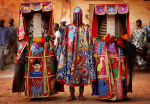
Masks and Masquerades
Many African societies have a rich tradition of masquerades, which are plays, ceremonies, or dances by masked performers. Masquerades provide entertainment, define social roles, and communicate religious meaning. The masks used in such performances may be treasured as works of art. They are also important symbols of ancestors, spirits, or even the history and culture of whole peoples. Masks Masks […]
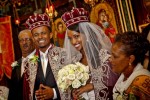
Marriage Systems
Marriage takes many forms in Africa. Throughout the continent, the diversity of systems reflects the traditions, religions, and economic circumstances of a wide variety of distinct cultures. Islamic laws and customs have shaped the institution of marriage in North Africa and in some nations of western and eastern Africa. In recent years, modern life, industry, and cities have brought changes […]
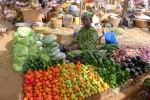
Markets
The open-air market is an important feature of African life in both rural and urban areas. As centers of commerce where cash and barter transactions take place, they play a key role in the economy. Most African agricultural products and craft goods enter the system of exchange at local markets, alongside imported products. Tailors, barbers, carpenters, and other tradesmen come […]

Maranke, John
1912–1963 African religious leader John Maranke was the founder of a successful independent church called the Apostolic Church of John Maranke. Today the church claims over 500,000 members in Africa, and many European converts outside the continent. Maranke was born Muchabaya Ngomberume in Southern Rhodesia (now Zimbabwe). His mother was the daughter of the Shona chief Maranke, whose clan name […]
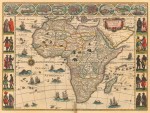
Maps and Mapmaking
If Africans had a mapmaking tradition before the coming of Europeans, no traces of it survived. The mapping of Africa was carried out largely by Europeans until independent African nations began producing their own maps in the late 1900s. The Greeks created the earliest maps of Africa, and they dealt mainly with the northern and eastern coastlines of the […]
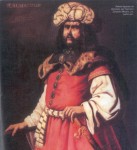
Mansur, al-
1549–1603 Ruler of Morocco Mulai al-Mansur was the sixth, and perhaps greatest, ruler of the Sa'di dynasty of MOROCCO. During his reign (1578–1603) Morocco enjoyed a long period of peace and prosperity, highlighted by its conquest of the ancient city of TIMBUKTU, now part of present-day MALI. A master of diplomacy, al-Mansur managed to balance relations with many competing foreign […]

Mansa Musa
Early 1300s Emperor of Mali Mansa Musa was the most famous ruler of the ancient West African empire of MALI. During his reign the Mali empire reached its greatest size, extending hundreds of miles from north to south and from east to west. However, Mansa Musa is best remembered for his pilgrimage to Mecca, the holy city of Islam, […]

Mandela, Nelson
1918–2013 President of South Africa Nelson Mandela is one of the best-known and most influential political leaders in Africa. Imprisoned for many years because of his activities against apartheid, he later became the first black president of SOUTH AFRICA. For many South Africans, Mandela symbolized the hope for black equality. Born in the Transkei region of South Africa, Mandela […]
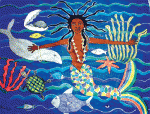
Mami Wata
Mami Wata is a female figure important to religious and social life in many parts of Africa. In some cultures she is a goddess. In others, the term Mami Wata refers to women who have the qualities of Mami Wata, including exceptional beauty and great power. Throughout western and central Africa, Mami Wata is a beautiful river goddess with long […]
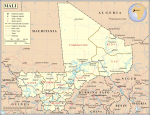
The Republic of Mali
POPULATION: 17.09 million (2014) AREA: 478,767 sq. mi. (1,240,007 sq. km) LANGUAGES: French (official); Bambara, numerous others NATIONAL CURRENCY: C.F.A. Franc PRINCIPAL RELIGIONS: Muslim 90%, Traditional 9%, Christian 1% CITIES: Bamako (capital), 919,000 (1999 est.); Mopti, Segou, Kayes, Gao, Kimparana ANNUAL RAINFALL: Varies from 20–60 in. (500–1,500 mm) in the south to 0–7 in. (0–175 mm) in the Sahara region ECONOMY: GDP $12.07 […]
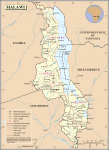
The Republic of Malawi
POPULATION: 16.70 million (2014) AREA: 45,747 sq. mi. (118,484 sq. km) LANGUAGES: English, Chewa (both official); Tonga, Yao, Tumbuka, Lomwe NATIONAL CURRENCY: Kwacha PRINCIPAL RELIGIONS: Protestant 55%, Muslim 20%, Roman Catholic 20%, Traditional 5% CITIES: Lilongwe (capital), 395,500 (1994 est.); Blantyre, Zomba, Mzuzu ANNUAL RAINFALL: 30–40 in. (760–1,010 mm) ECONOMY: GDP $4.258 billion (2014) PRINCIPAL PRODUCTS AND EXPORTS: Agricultural: tea, tobacco, sugar, cotton, […]
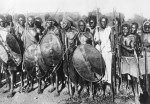
Maji Maji
Between 1905 and 1907 several small ethnic groups from Tanganyika (present-day TANZANIA) rebelled against German colonial authorities in an uprising known as the Maji Maji Rebellion. Although unsuccessful, the rebellion was one of the most important events in the history of East Africa. The Maji Maji Rebellion was centered in the southern highlands of German East Africa, a colonial territory […]
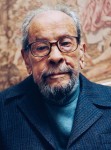
Mahfouz, Naguib
1911–2006 Egyptian writer Author of 40 novels and short story collections and more than 30 screenplays, Naguib Mahfouz received the Nobel Prize for literature in 1988. He was the first Arabic author to win that honor, which brought attention to his work and to modern Arabic fiction in general. During most of his writing career, Mahfouz also worked in […]

Maherero, Samuel
ca. 1854–1923 Chief of the Herero Samuel Maherero became chief of the HERERO people of NAMIBIA after the death of his father in 1890. Baptized and schooled by German missionaries, Maherero cooperated with German colonists who arrived in Namibia about this time. By selling land to the Germans, he obtained their support in overthrowing and conquering rival Herero chiefs. In […]
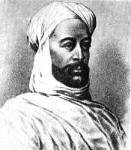
Mahdi, al-
ca. 1840–1885 Sudanese religious leader Al-Mahdi, the founder of an Islamic religious movement, seized control of SUDAN and established an empire that lasted for nearly 20 years. Born Muhammed Ahmad ibn Sayyid Abdullah, he began religious studies at an early age and joined a religious order in the capital city of KHARTOUM. He eventually left the order and moved […]

Maghreb
Maghreb, or Maghrib, is an Arabic word meaning “west” or “place of sunset.” It refers to the area of North Africa west of EGYPT. Known in ancient times as Africa Minor, the Maghreb refers to MOROCCO, ALGERIA, TUNISIA, and sometimes LIBYA. The interior desert regions of these countries are not always considered part of the Maghreb. The Maghreb contains […]

Madagascar
POPULATION: 23.57 million (2014) AREA: 226,658 sq. mi. (587,044 sq. km) LANGUAGES: Malagasy and French (both official) NATIONAL CURRENCY: Malagasy franc PRINCIPAL RELIGIONS: Traditional 52%, Christian 41%, Muslim 7% CITIES: Antananarivo (capital), 1,507,000 (2000 est.); Mahajanga, Toamasina, Fianarantsoa, Antseranana ANNUAL RAINFALL: Varies from 120–190 in. (3,000–5,000 mm) on the east coast to 20 in. (510 mm) in the southwest ECONOMY: GDP $10.59 billion […]
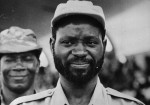
Machel, Samora Moises
1933–1986 President of Mozambique Samora Machel was a leader of the independence struggle in MOZAMBIQUE who became the country's first president in 1975. He became politically active as a young man, joining the movement known as FRELIMO that was dedicated to Mozambique's independence. He volunteered for FRELIMO military training in ALGERIA and was later sent to Mozambique to participate in […]
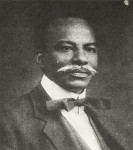
Macaulay, Herbert Samuel Heelas
1864–1946 Nigerian political leader Considered the founder of Nigerian nationalism, Herbert Samuel Heelas Macaulay promoted self-government in NIGERIA in the early 1900s. Born into an educated, Christian Nigerian family, Macaulay attended school in Lagos. In 1890 he won a scholarship from Nigeria's British colonial government to study abroad. After earning a degree in civil engineering in England, he returned to […]
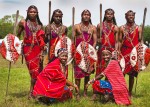
Maasai
The Maasai are made up of about a dozen ethnic groups who live in the Rift Valley of east Africa, primarily in KENYA and TANZANIA.These groups speak a language called Maa and share many cultural characteristics,such as the way they dress. Their social systems are based on clans and age-sets, groups of people of the […]
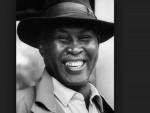
Lutuli, Albert
1898–1967 South African political leader Albert Lutuli was president of the African National Congress (ANC), a black-led political party in SOUTH AFRICA that fought for African rights. In 1960 he won the Nobel Peace Prize for his leadership in the nonviolent struggle against racism. The son of a preacher, Albert John Mavumbi Lutuli was born in Southern Rhodesia (present-day […]
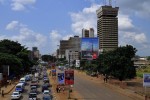
Lusaka
Lusaka, the capital of ZAMBIA, is a sprawling city of about 1.5 million people located in an agricultural region. A financial and commercial center, the city lies at the junction of major rail lines heading to the Copper Belt, the city of Livingstone, and TANZANIA. Lusaka became the capital of the British colony of Northern Rhodesia in 1935. The […]
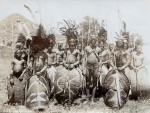
Luo
The Luo, an ethnic group of East Africa, inhabit a region on the eastern side of Lake Victoria. They trace their descent from people who migrated south from the Nile Valley region of southern SUDAN about 500 years ago. The majority of the Luo live in KENYA, but sizable numbers are also found in UGANDA and TANZANIA. Luo territory […]
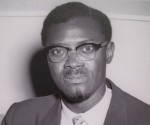
Lumumba, Patrice Emery
1925–1961 Congolese political leader Patrice Emery Lumumba was the first prime minister of Zaire, the country now called CONGO (KINSHASA). Known for his fervent nationalism and his commitment to freeing Africa from colonial rule, Lumumba played a leading role in gaining independence for his country. Born in the Kasai province of the Belgian Congo, Lumumba received a basic education at […]
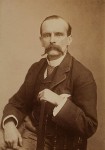
Lugard, Frederick John Dealtry
1858–1945 British colonial administrator Frederick John Dealtry Lugard played an important role in British colonial Africa. Lugard worked to end African slavery and slave trading. He also created the system of “indirect rule,” which gave traditional African authorities considerable control over their local affairs. Born in India of missionary parents, Lugard attended school in England and began a career in […]
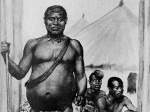
Lobengula
ca. 1836–1894 King of Matabeleland Lobengula was the last ruler of the NDEBELE kingdom of Matabeleland in present-day ZIMBABWE. After the death of his father, MZILIKAZI, the founder of the kingdom, civil war broke out. Lobengula eventually won the war, and he took the throne in 1870. However, the kingdom remained in chaos. Lobengula spent much of his reign […]
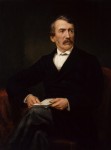
Livingstone, David
1813–1873 British missionary and explorer David Livingstone went to Africa as a missionary in the mid-1800s and became one of the continent's leading explorers and geographers. He also played a key role in the movement to end the SLAVE TRADE. Born in Blantyre, Scotland, Livingstone began work in a cotton mill at the age of ten. Determined to become a […]

Livestock Grazing
Livestock grazing, also known as pastoralism, has been practiced in Africa for many thousands of years. Nomadic herding cultures existed throughout the continent long before the arrival of Europeans. As colonial governments seized land for agriculture and industry, many pastoral societies were forced to abandon or modify their traditional lifestyles. Nevertheless, some African peoples still depend on herding for their livelihood. […]
Literature
African literature has developed from sources and influences that originated both within and outside of the continent. One major source, Africa's rich tradition of oral stories and histories, is much older than the continent's written literature. Written scripts arose in Africa in Egyptian hieroglyphs, a complex system of picture-writing used by the ancient Egyptians. However, written scripts using alphabets and […]
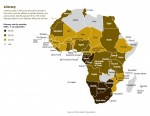
Literacy
One of the greatest challenges facing modern Africa is increasing the rate of literacy—the ability to read and write—among its population. Studies have shown that literacy leads to improvements in many areas of life. These include better health and nutrition for mothers and their children, a lower infant death rate, higher productivity in agriculture, and increased political participation. However, in […]
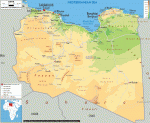
Libya
POPULATION: 6.259 million (2014) AREA: 679,400 sq. mi. (1,759,540 sq. km) LANGUAGES: Arabic (official); Italian, English, Berber dialects NATIONAL CURRENCY: Libyan Dinar PRINCIPAL RELIGIONS: Muslim (Sunni) 97% CITIES: Tripoli (capital), 1,822,000 (2000 est.); Benghazi, Misurata ANNUAL RAINFALL: Varies from about 4 in. (100 mm) in the steppe to less than half an inch (12.5 mm) in parts of the Sahara desert ECONOMY: […]
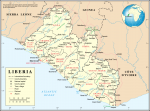
Liberia
POPULATION: 4.397 million (2014) AREA: 43,000 sq. mi. (111,370 sq. km) LANGUAGES: English (official); Mande, Kru, Bassa, Vai, Kpelle, others NATIONAL CURRENCY: Liberian dollar PRINCIPAL RELIGIONS: Traditional 70%, Muslim 20%, Christian 10% CITIES: Monrovia (capital), 962,000 (1999 est.); Greenville, Buchanan, Robertsport, Harper ANNUAL RAINFALL: Ranges from 203 in. (5,210 mm) on northwestern coast, to 100 in. (2,540 mm) at southeastern tip of country, […]
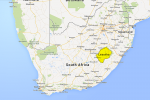
The Kingdom of Lesotho
POPULATION: 2.109 million (2014) AREA: 11,720 sq. mi. (30,555 sq. km) LANGUAGES: English, Sesotho (both official) NATIONAL CURRENCY: Maloti PRINCIPAL RELIGIONS: Christian 80%, Traditional 20% CITIES: Maseru (capital), 400,200 (1995 est.); Leribe, Mafeteng ANNUAL RAINFALL: 25 in. (635 mm) ECONOMY: GDP $2.088 billion (2014) PRINCIPAL PRODUCTS AND EXPORTS: Agricultural: livestock, mohair, corn, wheat, sorghum, peas, beans, potatoes, asparagus Manufacturing: food and beverages, […]
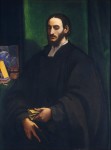
Leo Africanus
ca. 1485–ca. 1554 Arab geographer Leo Africanus was an Arab geographer who make numerous journeysin the northern and western regions Africa and wrote a bookabout the places he visited. Born in Spain and educated in MOROCCO, hetraveled extensively throughout North Africa and made three trips to EGYPT. South of the Sahara, he visited Gao and […]
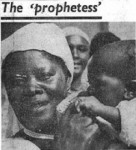
Lenshina, Alice
1920–1978 Zambian religious leader and prophet Alice Lenshina was the founder of a PROPHETIC MOVEMENT that gathered tens of thousands of followers. In the 1960s she led an uprising against the colonial government in ZAMBIA. Lenshina was born in northern Zambia among the Bemba people. As a young woman, she was preparing to join the Presbyterian Church at the mission center […]
Lebanese Communities
West Africa is home to many Lebanese immigrants and their descendants, most of whom are shopkeepers and small business owners. The first Lebanese arrived in the region in the late 1800s, and many of those who came later were following relatives. Lebanese immigration increased sharply between World Wars I and II. Many of the immigrants settled in SENEGAL and other […]
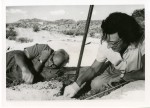
Leakey Family
For two generations, the Leakey family of KENYA has contributed significantly to paleoanthropology—the study of early humans and their ancestors—in Africa. Fossils discovered by the Leakeys helped establish the continent as the site of human origins. Members of the family who participated in this research include Louis S.B. Leakey (1903–1972); his second wife, Mary Douglas Leakey (1913–1996); their son, Richard […]
Laws and Legal Systems
The laws and legal systems of Africa have developed from three distinct legal traditions: traditional or customary African law, Islamic law, and the legal systems of Western Europe. In many cases European or Islamic legal traditions have replaced or significantly modified traditional African ones. Even so, customary law still exerts a strong influence in some areas of African life. AFRICAN […]
Languages
With more than 1,500 different languages, Africa boasts greater linguistic variety than any other continent. The tremendous range includes major languages such as Swahili and Hausa, spoken by millions of people, and minor languages such as Hazda, which have fewer than a thousand speakers. The linguistic situation is constantly changing. While many of the continent's major languages are rapidly […]
Land Ownership
In modern Africa conflicting views about land ownership cause legal, political, and economic problems. Traditional African ideas concerning the use, inheritance, and disposal of land differ sharply from those of Western nations. During the colonial era, European powers usually imposed their own ideas about ownership on their African territories, often ignoring indigenous practices. The resulting confusion about land use and ownership […]

Lagos
Lagos is the chief port and former capital city of NIGERIA. Founded by the YORUBA people in the 1400s, Lagos developed into a large regional trading post. By the 1790s it had become a major center of the Atlantic SLAVE TRADE. The British navy bombarded Lagos in 1851, and ten years later Britain gained control over the city through […]
Labor
Africa has a number of different labor systems that reflect an economy in the process of change. Still occupying an important role are the traditional forms of work and division of labor based on subsistence farming. Industrial capitalism has brought new forms of labor organization that have transformed Africa—without completely displacing the earlier systems. AFRICAN LABOR SYSTEMS Africa is still […]